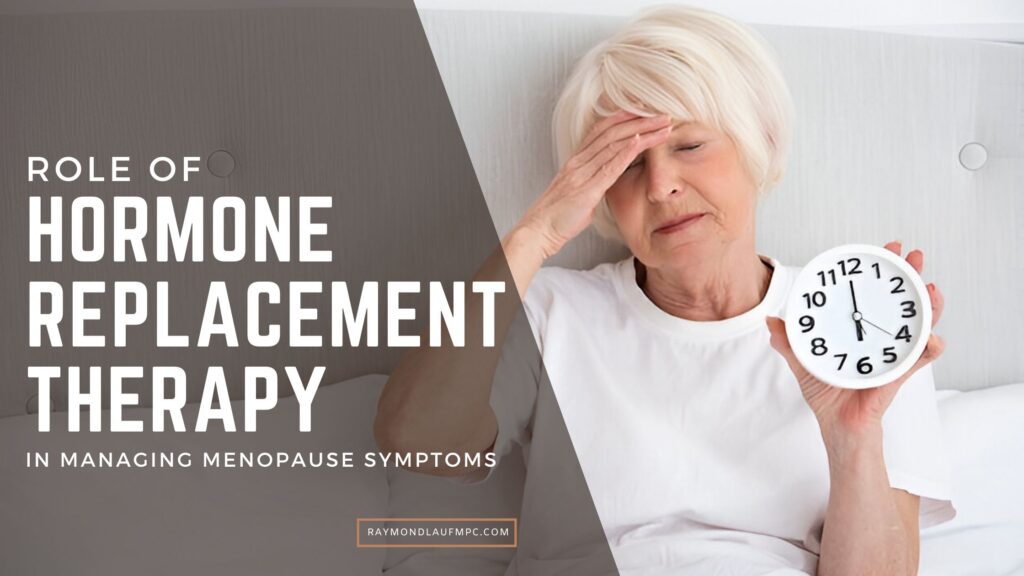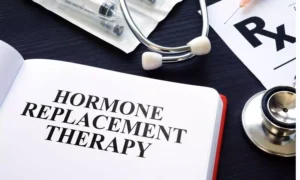Menopause is a natural biological process that marks the end of a woman’s reproductive years. While it’s a normal part of aging, the transition can bring about a range of challenging symptoms that can significantly impact a woman’s quality of life. One of the most effective treatments for managing these symptoms is Hormone Replacement Therapy (HRT). At Raymond Lau Family Medicine and Primary Care in Lower Manhattan, we offer comprehensive HRT services to help women navigate this important life stage with greater comfort and confidence.
Understanding Menopause
Before delving into the role of HRT, it’s crucial to understand what menopause entails. Typically occurring between the ages of 45 and 55, menopause is defined as the point when a woman has not had a menstrual period for 12 consecutive months. This transition is preceded by perimenopause, which can last several years and is characterized by fluctuating hormone levels.
During menopause, the ovaries gradually produce less estrogen and progesterone, two hormones that play vital roles in regulating the menstrual cycle and maintaining various bodily functions. As these hormone levels decline, women may experience a variety of symptoms, including:
1. Hot flashes and night sweats
2. Vaginal dryness and discomfort during intercourse
3. Mood swings and irritability
4. Sleep disturbances
5. Loss of bone density
6. Changes in skin elasticity
7. Weight gain and slowed metabolism
8. Thinning hair and dry skin
9. Loss of breast fullness
10. Urinary incontinence
The severity and duration of these symptoms can vary greatly from one woman to another. While some may experience minimal discomfort, others find that menopausal symptoms significantly interfere with their daily lives, relationships, and overall well-being.
Symptoms of Menopause
As your body undergoes hormonal changes, you’ll likely experience a range of symptoms associated with menopause. These symptoms typically begin during perimenopause, the transitional phase before menopause, and can persist for several years.
The most common symptom is hot flashes, characterized by sudden feelings of heat, often accompanied by sweating and flushing. You may also experience night sweats, which can disrupt your sleep patterns. Vaginal dryness and discomfort during intercourse are frequent complaints, resulting from decreased estrogen levels.
Mood changes, including irritability, anxiety, and depression, are common during this period. You might notice cognitive changes, such as difficulty concentrating or memory lapses. Urinary symptoms, like increased frequency or urgency, can also occur.
Physical changes include skin thinning, reduced breast fullness, and potential weight gain, particularly around the waist. Bone density may decrease, increasing the risk of osteoporosis. Some women report joint pain or muscle aches.
It’s important to note that the severity and duration of these symptoms vary widely among individuals. While some women experience minimal discomfort, others find their symptoms significantly impact their quality of life, necessitating medical intervention.
What Is Hrt?
Hormone Replacement Therapy (HRT) is a medical treatment designed to alleviate the symptoms of menopause by supplementing the body with hormones it’s no longer producing in sufficient quantities. HRT typically involves the administration of estrogen, often combined with progestin for women who still have their uterus. This treatment aims to restore hormonal balance and reduce the severity of menopausal symptoms.
HRT is available in various forms, including pills, patches, gels, creams, and vaginal rings. The choice of delivery method depends on your specific needs and preferences. Your doctor will determine the most appropriate type and dosage based on your individual symptoms, medical history, and risk factors.
HRT can effectively manage a range of menopausal symptoms, such as hot flashes, night sweats, vaginal dryness, and mood swings. It may also help prevent bone loss and reduce the risk of osteoporosis. However, it’s important to note that HRT isn’t suitable for everyone. Your healthcare provider will carefully assess your situation to determine if HRT is appropriate for you, considering potential risks and benefits.
Benefits of HRT
Building on our understanding of HRT, let’s explore its numerous benefits. HRT effectively relieves many menopausal symptoms, significantly improving your quality of life. You’ll experience a reduction in hot flashes and night sweats, which can disrupt sleep and daily activities. HRT also helps maintain vaginal health, reducing dryness and discomfort during intercourse.
Beyond symptom relief, HRT offers long-term health benefits. It protects against osteoporosis by maintaining bone density, reducing your risk of fractures. You’ll also see improvements in cardiovascular health, as HRT can help maintain healthy cholesterol levels and reduce the risk of heart disease when started early in menopause.
Cognitive function may benefit from HRT, potentially reducing the risk of Alzheimer’s disease. Some studies suggest it may improve mood and reduce the risk of depression associated with menopause. Additionally, HRT can help maintain skin elasticity and hydration, potentially slowing the visible signs of aging.
It’s important to note that the benefits of HRT can vary depending on your individual health profile, the type of hormones used, and when treatment is initiated. Always consult with your healthcare provider to determine if HRT is right for you.
Risks Associated With HRT
While HRT offers numerous benefits, it’s crucial to understand the potential risks associated with this treatment. Studies have shown that long-term use of combined estrogen-progestogen HRT can increase your risk of certain health conditions. These include:
- Breast cancer
- Ovarian cancer
- Blood clots (venous thromboembolism)
The risk of developing these conditions varies depending on factors such as your age, medical history, and the type and duration of HRT you’re using. For instance, the risk of breast cancer increases with longer use of combined HRT, particularly after five years of treatment. Similarly, the risk of blood clots is highest in the first year of HRT use and in women who are overweight or smoke.
It’s important to note that the risks aren’t the same for all types of HRT. Estrogen-only HRT, typically prescribed for women who’ve had a hysterectomy, carries a lower risk of breast cancer compared to combined HRT. However, it may slightly increase the risk of endometrial cancer in women who still have a uterus. Your healthcare provider will carefully assess your individual risk factors and weigh them against the potential benefits of HRT to determine the most appropriate treatment plan for you.
Types of HRT
There are several types of HRT available, and the choice depends on individual needs, medical history, and preferences:
1. Estrogen-only therapy: This is typically prescribed for women who have had a hysterectomy and no longer have a uterus.
2. Combined estrogen and progesterone therapy: This is the most common form of HRT for women who still have their uterus. The addition of progesterone helps protect against endometrial cancer.
3. Low-dose vaginal estrogen: This localized treatment is used primarily to address vaginal symptoms and urinary issues.
4. Bioidentical hormone therapy: These hormones are chemically identical to those produced by the body and are often custom-compounded based on a woman’s specific hormone levels.
HRT can be administered in various forms, including:
- Oral tablets
- Transdermal patches
- Gels or creams
- Vaginal rings or suppositories
- Injections
- Pellets inserted under the skin
Who Should Consider HRT?
In light of the potential benefits and risks, hormone replacement therapy (HRT) isn’t suitable for everyone. You should consider HRT if you’re experiencing moderate to severe menopausal symptoms that significantly impact your quality of life. These symptoms may include hot flashes, night sweats, vaginal dryness, and mood changes. Additionally, if you’re at risk for osteoporosis or have had an early menopause (before age 45), HRT might be recommended.
Before starting HRT, it’s crucial to consult with a healthcare provider like Dr. Lau at 89 Bowery, who can assess your individual health profile and risk factors. They’ll consider:
- Your age and time since menopause onset
- Personal and family medical history
- Lifestyle factors and overall health status
HRT isn’t typically recommended if you have a history of breast cancer, ovarian cancer, endometrial cancer, blood clots, stroke, or liver disease. Women with undiagnosed vaginal bleeding or a high risk of cardiovascular disease should also approach HRT with caution. Your healthcare provider will weigh the potential benefits against the risks, considering factors such as the type, dose, and duration of HRT. Regular follow-ups and monitoring are essential to ensure the therapy’s effectiveness and safety.
The Role of HRT in Managing Menopause Symptoms
Hormone Replacement Therapy plays a crucial role in alleviating many of the uncomfortable and disruptive symptoms associated with menopause. Let’s explore how HRT addresses specific menopausal concerns:
1. Hot Flashes and Night Sweats
Hot flashes, characterized by sudden feelings of intense heat often accompanied by sweating and flushing, are among the most common and bothersome symptoms of menopause. HRT has been shown to be highly effective in reducing the frequency and severity of hot flashes. By stabilizing hormone levels, HRT can help regulate the body’s temperature control mechanisms, providing relief from these sudden, uncomfortable sensations.
2. Vaginal Health and Sexual Function
The decline in estrogen levels during menopause can lead to vaginal atrophy, characterized by thinning, drying, and inflammation of the vaginal walls. This can result in discomfort during intercourse, urinary symptoms, and an increased risk of vaginal infections. HRT, particularly low-dose vaginal estrogen treatments, can help restore vaginal health by improving lubrication, increasing blood flow to the area, and maintaining the elasticity of vaginal tissues. This not only enhances comfort but can also improve sexual satisfaction and overall quality of life.
3. Bone Health
Estrogen plays a crucial role in maintaining bone density. As estrogen levels drop during menopause, the risk of osteoporosis and fractures increases significantly. HRT has been shown to be effective in preventing bone loss and reducing the risk of osteoporosis-related fractures. By maintaining adequate estrogen levels, HRT helps to slow bone resorption and promotes bone formation, thereby preserving bone strength and density.
4. Mood and Cognitive Function
Many women experience mood swings, irritability, and even depression during the menopausal transition. Hormonal fluctuations can impact neurotransmitter function in the brain, affecting mood and emotional well-being. HRT can help stabilize mood by balancing hormone levels, potentially reducing the risk of depression and anxiety associated with menopause. Some studies also suggest that HRT may have a positive impact on cognitive function, potentially reducing the risk of cognitive decline and dementia, although more research is needed in this area.
5. Cardiovascular Health
The role of HRT in cardiovascular health is complex and has been the subject of much research and debate. While earlier studies raised concerns about increased cardiovascular risks, more recent research suggests that HRT, when started early in menopause (typically before age 60 or within 10 years of menopause onset), may have cardiovascular benefits.
Alternative Treatments
For women who can’t or choose not to use hormone replacement therapy, several alternative treatments can help manage menopausal symptoms. These options include lifestyle changes, non-hormonal medications, and complementary therapies.
Lifestyle modifications play a crucial role in symptom management. Regular exercise can improve mood, sleep quality, and bone density. A balanced diet rich in phytoestrogens, found in soy products and certain vegetables, may alleviate hot flashes. Avoiding triggers like caffeine, alcohol, and spicy foods can also reduce the frequency of hot flashes.
Non-hormonal medications offer targeted relief for specific symptoms. Selective serotonin reuptake inhibitors (SSRIs) and serotonin-norepinephrine reuptake inhibitors (SNRIs) can effectively reduce hot flashes and improve mood. For vaginal dryness, over-the-counter lubricants and moisturizers provide localized relief.
Complementary therapies, while not extensively studied, show promise for some women. Acupuncture may help with hot flashes and sleep disturbances. Cognitive behavioral therapy can address mood changes and sleep issues. Herbal supplements like black cohosh and evening primrose oil are sometimes used, but their efficacy and safety require further research.
Latest Research on HRT
Recent studies on hormone replacement therapy (HRT) have shed new light on its benefits and risks. Research now suggests that the timing of HRT initiation plays a crucial role in its effectiveness and safety profile. The “window of opportunity” hypothesis proposes that starting HRT within 10 years of menopause onset or before age 60 may offer the most favorable risk-benefit ratio.
- Cardiovascular effects: Early initiation may reduce coronary heart disease risk.
- Cognitive function: Potential neuroprotective effects when started near menopause.
- Bone health: Significant reduction in osteoporosis and fracture risk.
Large-scale studies have also refined our understanding of HRT’s impact on breast cancer risk. While combined estrogen-progestogen therapy is associated with a slightly increased risk, estrogen-only therapy in women with hysterectomies shows a reduced risk. Dosage and administration routes are now being scrutinized, with transdermal estrogen potentially offering a lower risk of venous thromboembolism compared to oral formulations. Ongoing research is exploring bioidentical hormones and their long-term effects, as well as personalized approaches to HRT based on genetic profiles and individual risk factors.
Conclusion
You’ve learned about the complexities of HRT in managing menopause symptoms. It’s crucial to weigh the benefits against potential risks when considering this treatment. Consult your healthcare provider to determine if HRT is appropriate for your specific situation. Remember, alternative treatments exist for those who can’t or prefer not to use HRT. Stay informed about the latest research, and make your decision based on evidence-based information and professional medical advice.







